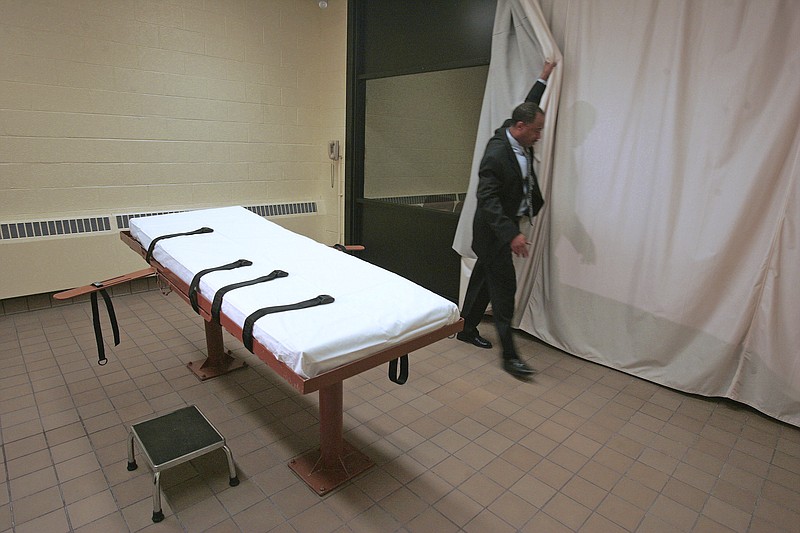If You Go
What: Criminal justice speaker series featuring Ray Krone and panelWhere: Chattanooga State’s Center for Advanced TechnologyWhen: Thursday, Oct. 27, 6 p.m.
View other columns by David Cook
Need a reason to be against the death penalty?
How about a dozen?
1. It's not reliable.
Since 1973, a long line of death row inmates have been exonerated, their innocence discovered years after their capital trial, meaning that what needs to be our purest, most trusted system of justice is our most flawed: We have imprisoned innocent people and, more than likely, executed them, as well.
Last year, the 156th inmate was set free.
"And those are just the ones we know about," Ray Krone told the Times Free Press.
In 2002, Krone became the 100th exoneree. Sentenced to die in Arizona for a crime he didn't commit, Krone was later released after DNA evidence proved his innocence. He now lives in Tennessee. With Sister Helen Prejean, Krone co-founded Witness to Innocence.
2. The death penalty is applied in unconstitutional ways.
Instead of being used in a majority of American courtrooms, death penalty sentencing only happens in approximately 2 percent of all counties, according to the Death Penalty Information Center.
Such geographical arbitrariness - how can we have a system of justice that 98 percent of all counties ignore? - makes it unusual, unequal and, many argue, unconstitutional.
3. Death row is a place of poverty.
"Almost all death row inmates could not afford their own attorney at trial," Amnesty International reports. "Court-appointed attorneys often lack the experience necessary for capital trials and are overworked and underpaid."
"From the U.S. to Iran, the single most common demographic amongst those on death row is poverty," adds Jack Todd in Borgen magazine.
4. Death row is racist.
"More than half of the people on death row in this country are people of color," reports the Equal Justice Initiative in Montgomery, Ala.
If the murder victim is white, there's a greater chance death row sentencing will take place, especially if the accused is black. Blacks are less than 15 percent of the U.S. population, yet more than 40 percent of the nearly 3,000 death row inmates.
Of the 63 males on Tennessee's death row, 30 are black.
"Thirty-five percent of those executed since 1976 have been black," states the EJI.
A growing body of research illustrates the connection between the death penalty and lynching. As lynching became taboo and outlawed, the practice morphed into a legal version of itself: death row. If lynch-happy counties couldn't hang a black man anymore, they could legally sentence him to die in prison.
Between the 1870s and 1950s, Shelby County, Tenn., had one of the highest rates of lynchings in the South, according to the EJI.
Today, the majority of inmates on Tennessee's death row - 27 of 64 - come from Shelby County.
6. It's a money pit.
California has spent $4 billion on its death penalty system since 1976, according to DPIC. A North Carolina study shows death row trials cost $2 million more than life-without-parole trials.
With 64 inmates, how many millions is Tennessee's death row costing each year?
7. By shifting sentencing from death to life without parole, all that money could be spent elsewhere.
- Funding addiction programs.
- Aiding victims' families.
- Staffing prisons.
- Boosting police training to diagnose and aid the mentally ill.
A new coalition, Tennessee Alliance for the Severe Mental Illness Exclusion, is building support among communities, legislators and law enforcement on ways to exclude the mentally ill from death row sentencing.
8. Less than half of all Americans favor the death penalty, according to Pew Research.
9. Executions are at historic lows.
10. Research shows the death penalty is not an effective deterrent to crime.
11. The death penalty is hollow justice.
Victims' families wait years, if not decades, for an execution that sometimes never comes. Life without parole provides closure in a way the death penalty process does not.
12. Killing our own citizens is a bizarre and bloodthirsty practice at odds with democratic America.
"I believe the system is a disaster on every level," said the Rev. Stacy Rector. "It's falling apart."
Rector, a Presbyterian minister, is the executive director of Tennesseans Against the Death Penalty. Thursday evening, she will join a diverse panel - from conservatives to former cops - each of whom believes the death penalty in Tennessee ought to be abolished:
- Amy Lawrence, with Tennessee Conservatives Concerned about the Death Penalty.
- Marc Easley, former Chattanooga police officer who's working with TASMIE. (And is one of the most powerful speakers I've heard).
- Krone, the 100th exoneree, whose story alone - which he'll tell - is reason enough.
David Cook writes a Sunday column and can be reached at dcook@timesfreepress.com or 423-757-6329. Follow him on Facebook at DavidCookTFP.

